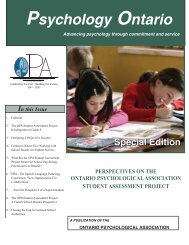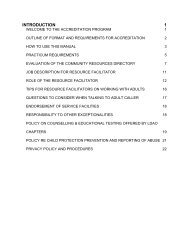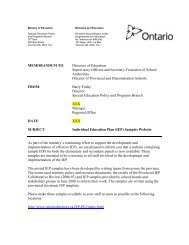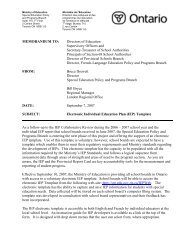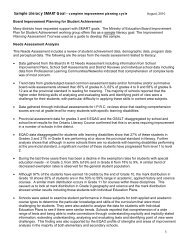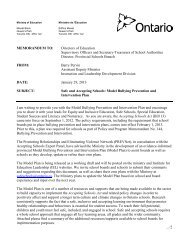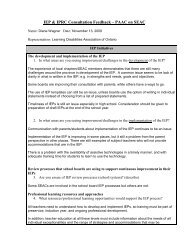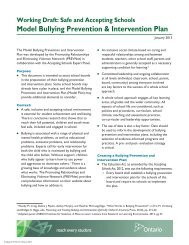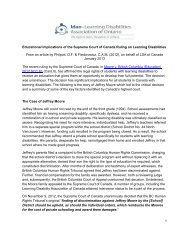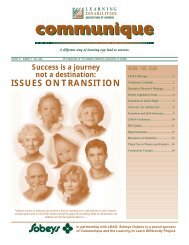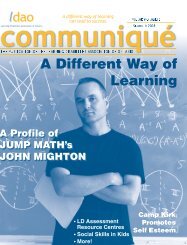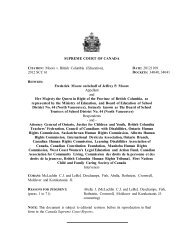Spring 2012 - Learning Disabilities Association of Ontario
Spring 2012 - Learning Disabilities Association of Ontario
Spring 2012 - Learning Disabilities Association of Ontario
You also want an ePaper? Increase the reach of your titles
YUMPU automatically turns print PDFs into web optimized ePapers that Google loves.
Reaching Out to Older People with Dyslexiagain confidence. It means an awful lot. It means that I can learn more for myself. I can writemore and have the confidence to pick up a pen. I want to do more. <strong>Learning</strong> becomes infectious.”The causes <strong>of</strong> dyslexia are not fully understood, but there is strong evidence to suggest small butsignificant biological differences between the brains <strong>of</strong> dyslexic and non-dyslexic people in theprocessing <strong>of</strong> visual, motor and auditory information, particularly in relation to language. Dyslexiaalso tends to run in families, and adults may only become aware <strong>of</strong> their own dyslexia for the firsttime when younger family members are identified as having dyslexia.Dr. Rebecca Thompson, a psychology research fellow at the Research Institute for the Care <strong>of</strong>the Elderly at St. Martin’s Hospital, Bath, said: “In addition to thinking about the effects <strong>of</strong> agingon dyslexia, work in this area also needs to take into account the fact that many older adults maynever have had their dyslexia identified because at the time when they were being educated, itwas a little known and little diagnosed condition. They have therefore had to develop copingstrategies to deal with their lives, and <strong>of</strong>ten feel that they have missed out because <strong>of</strong> their lack <strong>of</strong>literacy.”One 60-year old gentleman said: “I was unable to read and write and, at the age <strong>of</strong> 60, I decidedI couldn’t carry on like that. I couldn’t go shopping properly or go to the library, for example. I wasunable to function normally. If I couldn’t find someone to help me with letters or bills, I just threwthem in the bin. I never really did overcome my difficulties before I came to the adult college,where I’ve really enjoyed meeting new people. My learning has made me much more confident.“For the first time in my life I can express myself in writing. When I came to college I said I wantedto write a book about myself. I have now done this, and although the book itself is only small, ithas been a major achievement for me. I can also now do things like buy a T.V. guide and seewhat will be on TV. Little things like this make all the difference in the world to me.”The assessment <strong>of</strong> dyslexia in adults, and especially in older adults, can be complex becausemany adults have developed coping strategies which may effectively compensate for any difficultiesthey experience. In addition, older adults may have reduced visual and auditory acuity, aswell as medical conditions that may affect their processing <strong>of</strong> information and their memory. All <strong>of</strong>these need to be accounted for during the assessment process.Shirley Cramer, Chief Executive <strong>of</strong> Dyslexia Action, National Council Member, The <strong>Learning</strong> and<strong>Learning</strong> <strong>Disabilities</strong> <strong>Association</strong> <strong>of</strong> Kingston 4



